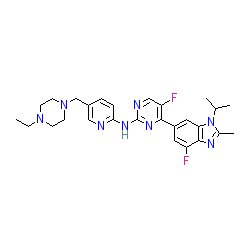GtoPdb is requesting financial support from commercial users. Please see our sustainability page for more information.
|
Synonyms: CS-1230 | HY-16297A | LY 2835219 | LY-2835219 | LY2835219 | Verzenio® | Verzenios®
abemaciclib is an approved drug (FDA (2017), EMA (2018))
Compound class:
Synthetic organic
Comment: Abemaciclib (LY2835219) is a selective ATP-competitive inhibitor of the cyclin-dependent kinases CDK4 and CDK6 [6].
Ligand Activity Visualisation ChartsThese are box plot that provide a unique visualisation, summarising all the activity data for a ligand taken from ChEMBL and GtoPdb across multiple targets and species. Click on a plot to see the median, interquartile range, low and high data points. A value of zero indicates that no data are available. A separate chart is created for each target, and where possible the algorithm tries to merge ChEMBL and GtoPdb targets by matching them on name and UniProt accession, for each available species. However, please note that inconsistency in naming of targets may lead to data for the same target being reported across multiple charts. ✖ |
|
|||||||||||||||||||||||||||||||||||
| No information available. |
Summary of Clinical Use  |
| Having earlier been granted Priority Review by the FDA (July 2017), in September 2017, abemaciclib was fully approved for the treatment of HR+ve, HER2-ve advanced or metastatic breast cancer that has progressed after endocrine therapy. In February 2018, the FDA expanded approval to include use as initial endocrine-based therapy for postmenopausal women with HR+ve, HER2-ve advanced or metastatic breast cancer. Abemaciclib is the third CDK4/6 inhibitor approved for select breast cancer types, following on the heels of palbociclib (2015) and ribociclib (earlier in 2017). It has also reached Phase 3 clinical trial for non-small cell lung cancer, and additional clinical trials are underway for treatment of lymphomas. Abemaciclib is being evaluated either alone or in combination with other antineoplastics. Click here to link to a complete list of ClinicalTrials.gov's registered abemaciclib (research code LY2835219) trials. |
Mechanism Of Action and Pharmacodynamic Effects  |
| The CDK4/6 pathway is key to regulating cell growth in many types of human cancer [1,7-8], such as genetic subtypes of non-small cell lung cancer (NSCLC, [2,7,9], melanoma, Mantle cell lymphoma (MCL), and ovarian and breast cancers [2-3]. CDK4/6 inhibitors are designed to interfere with this pathway to ultimately prevent cell cycle transition from G1 to S phase, induce cell senescence and in some cases cause apoptosis [2]. In some breast cancers the cyclin D1-CDK4 pathway appears to mediate resistance to HER2-directed therapies. Abemaciclib is able to re-sensitise such resistant tumours to conventional HER2 blockers [5]. Abemaciclib's developer, Eli Lilly has produced a mechanism of action infographic which you can access here. |







